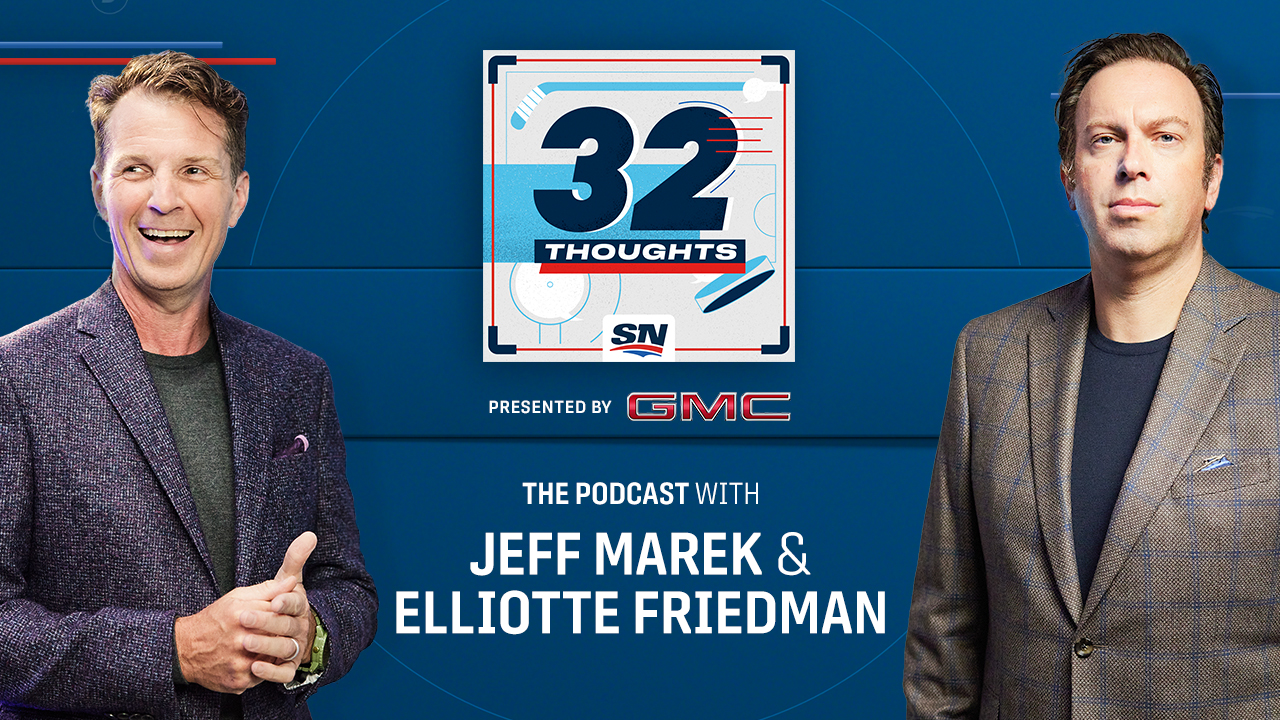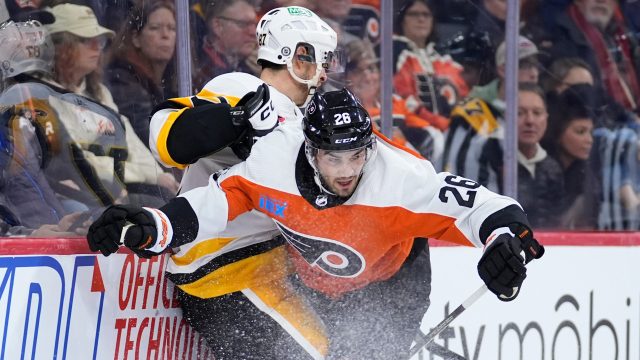
TORONTO — The Toronto Maple Leafs‘ greatest and most obvious roster hole was on full display as their wonderful win streak came to a crashing halt.
So, as general manager Brad Treliving works the phones and weighs his imperfect options, as the trade deadline creeps closer on the calendar (nine days left!), head coach Sheldon Keefe made it clear how he feels about the lack of lefty-righty balance on his blueline.
“I don’t like it,” Keefe said Tuesday morning, before injury and illness forced the Leafs into dressing six lefthanded defencemen against the Vegas Golden Knights.
Looking fatigued from last week’s four-time-zone-hopping Western Conference swing, Toronto ran up against a healthy Stanley Cup champion defence and fell flat, 6-2.
The Leafs’ top pair of Morgan Rielly and T.J. Brodie, both of whom land somewhere between awkward and awful when patrolling the right lately, finished dash-4.
“Yeah, it’s challenging. But I feel good over there. We try to work on that stuff in practice, changing partners. There’s obviously room for improvement,” Rielly said postgame.
“It’s just the opposite of what you’re used to, when you’re closing gaps, crossing over outside of the offensive zone. But it’s not about excuses. It’s actually easier in the offensive zone. There’s good things as well.”
Rielly is smart to spin positive, and he has always been willing to take on difficult assignments for the good of the group.
Still, it’s up to managers and coaches to place players in positions to succeed.
In an elimination series, the Leafs don’t want Rielly overthinking his feet or twisting his stick to accept a pass. They want their No. 1 defenceman comfortable and confident.
For a long while, that meant having the versatile Brodie play his offside. And it worked. Until it didn’t.
Until, particularly during Rielly’s suspension, it became evident that getting the most out of the 33-year-old Brodie means deploying him on his left too.
As far back as that week in June they let Justin Holl walk to the team directly behind them in the standings and lost out on the Luke Schenn sweepstakes, the Maple Leafs have been hunting for the same piece on so many clubs’ wish list: a pure defender who kills penalties, blocks shots, happily stays at home, and curves his stick right.
Their specific deficiency has been exacerbated by the absence of the three righties Treliving began this season with: John Klingberg (season-ending hip surgery), Conor Timmins (mono), and Timothy Liljegren (day-to-day with an undisclosed injury).
“We do have a number of guys that are at least comfortable on the right side, and certainly if not comfortable at least have experience with it and can manage that and just press on,” Keefe spins.
Pressing on is fine for a couple weeks; pressing on does not spell success in a seven-game chess match, where the opposition will discover your weakness and pick at it like a back zit.
The example that should be freshest in Keefe’s mind is Toronto’s Round 2 loss to the Florida Panthers, during which his all-southpaw “shutdown” pair of Jake McCabe and Brodie went minus-6 and minus-4, respectively.
To his credit, McCabe — whose simple, nasty approach to the position is refreshing — has performed admirably this winter when asked to play his unnatural side. And the inconsistent Liljegren had picked up his performance before getting “banged up” in Colorado.
Yet even at full health, a rarity in deep spring, Toronto’s pairings feel patchwork.
“The pairs in general are a challenge,” says Keefe, expressing vulnerability during D-zone faceoffs and penalty-kill clears. “You got two lefties out there, you become a lot more predictable in your exits.”
Vegas’s savvy coach, Bruce Cassidy, explains how to take advantage of opponents who run their blueline like a Leftorium.
“On D-to-D [passes]in the neutral zone, sometimes if you take a good angle, you can limit where they can go with the puck or force a quicker play,” Cassidy says.
“Pucks coming around the boards in the offensive zone, you recognize you can get on top of them a little quicker, because they have to take it backhand to forehand.”
If a forecheck-first opponent like Florida — the reigning Team to Beat in the East — employs a dump-and-chase offence, the Maple Leafs blueline, constructed as is, will be in trouble.
One imagines Paul Maurice gleefully instructing his speedy hounds to flip the puck deep right. Bang bodies. Force turnovers.
There are no easy solutions here.
Either Treliving crosses his fingers and hopes his predominately lefty D-core can squeak by with the support of hot goaltending and Toronto’s world-class power-play and enviable even-strength offence.
Or he spends big (think: first-round pick or equivalent) on top rental target Chris Tanev. Or he spends really big on a righty with term, like David Savard, Adam Larsson, or Colton Parayko.
Or a little less for a reliable righty whose impact may ultimately be minimal and should really slot in on championship team’s third pair. Names like Alexandre Carrier, Will Borgen, and ex-Leafs Ilya Lyubushkin and Zach Bogosian come to mind.
Even a smaller purchase like that, however, gets complicated by Toronto’s lack of second-round picks and the fact that Nashville and Seattle are lingering around the wild-card race.
The RD market is thin and muddy, yet one thing is clear: How much Treliving is willing to spend on a right-shot defenceman will tell us how seriously he believes this edition of the Maple Leafs has a legitimate shot to win a Cup.








